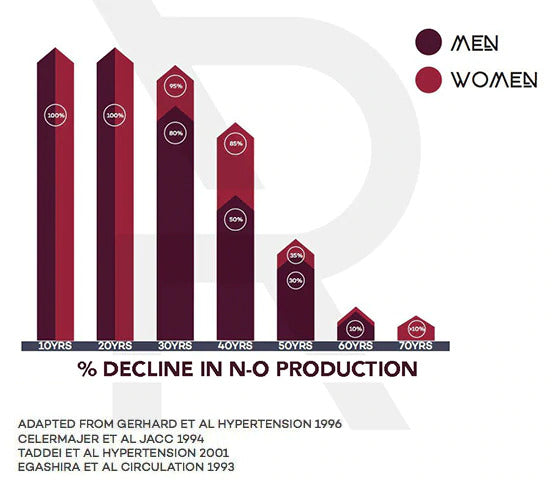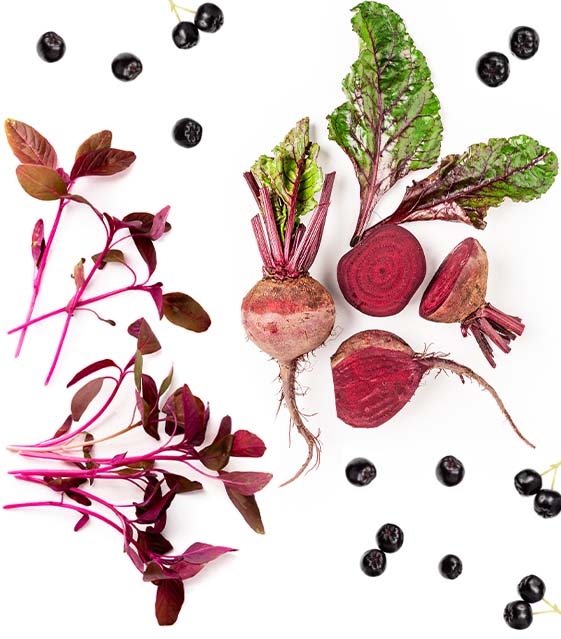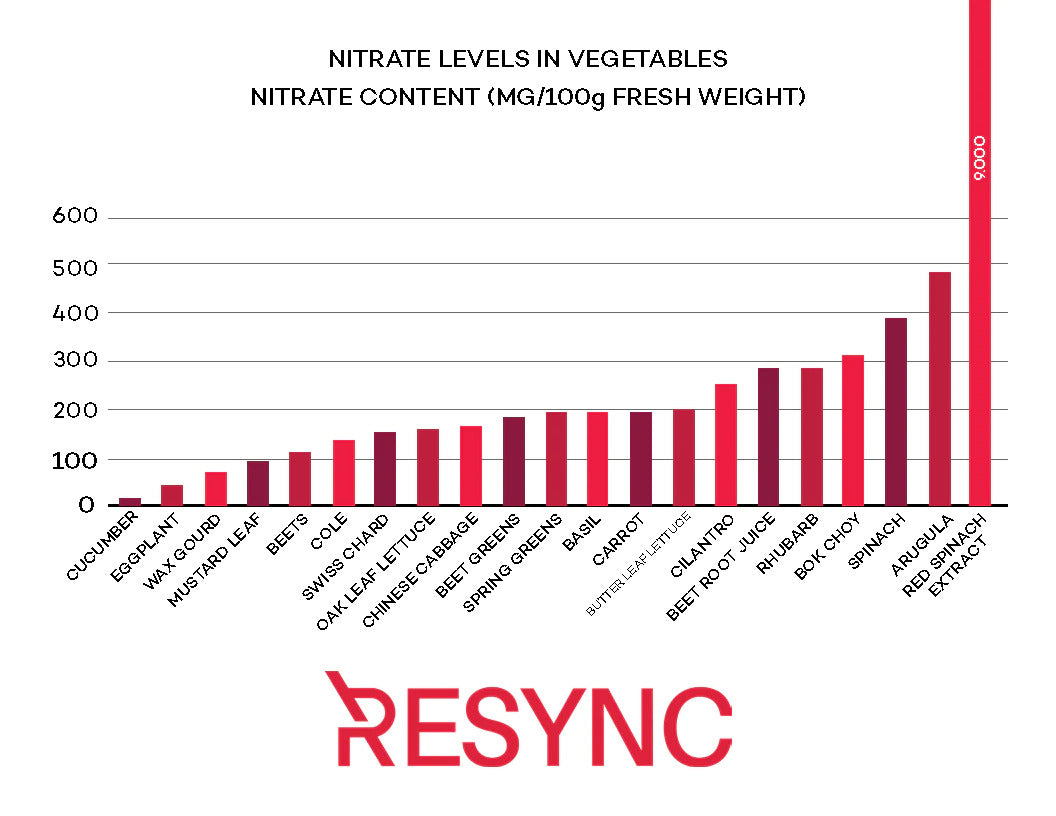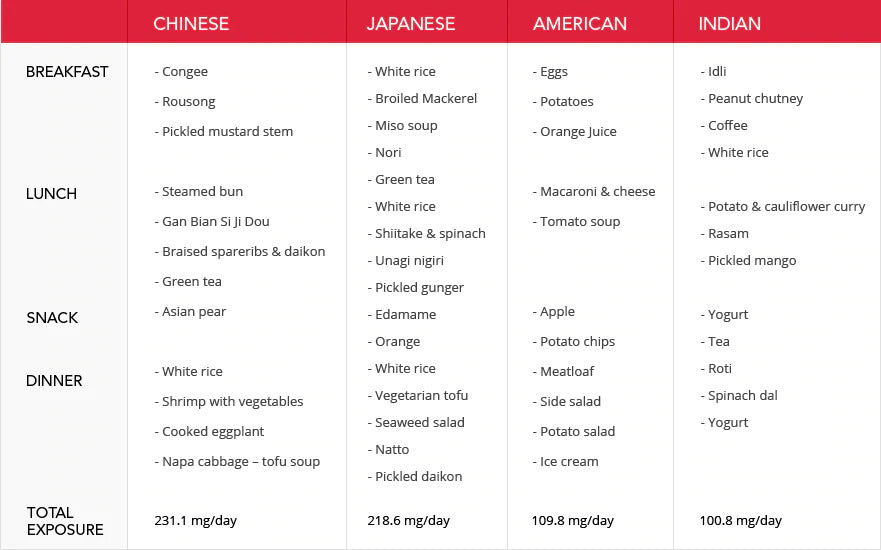Why Nitric oxide matters
Nitric oxide
Expanded
blood vessels
Facilitated
absorption of
oxygen by
muscles
Enhanced
energy, vitality,
and health

Nitric oxide (N-O) is a naturally occurring gas that transmits signals in your body. Even though it may be abundant in a healthy young body, it has a short half-life (it is very unstable), and needs to be replenished regularly.
It supports many essential reactions underneath your skin, which you may ignore, yet you need to live a healthier life, regardless of your age.
Perhaps most famously (at least amongst scientists and nutritionists), nitric oxide is known for being a vasodilator, but what does that mean to you?
As a vasodilator, nitric oxide has the potential to relax and widen your blood vessels, allowing for more effective and efficient blood flow, nutrient delivery, and better oxygenation throughout the body.
All in all, nitric oxide supports you to keep your body flowing with energy!

3 MAIN Reasons Why Nitric Oxide Levels Drop
& How To Replenish Them
AGE
We know natural aging processes cannot be reversed. But the good news is, they can be positively influenced by a targeted diet. Even though our energy levels and nitric oxide decrease as we mature , we can support nitric oxide levels with clean diet and healthy supplements filled with nitric oxide plant-based precursors and antioxidants , just like the ingredients in Resync products.
By the age of 40, men produce about 50% of the nitric oxide they did in their teens and twenties. Women only produce about 35% of what they did in their twenties at age 40.

DIET
What we eat and put into our body has a huge effect on nitric oxide levels. We can use this to our advantage by eating proper plant-based ingredients (not just a healthy diet) to promote nitric oxide. However, a large majority of people tend to have a dietary insufficiency of green and red leafy vegetables which only exacerbates the issue.
What does this mean?
You do need to pay attention to your daily diet to stay on top of nitric oxide levels. The more natural, plant-based nitrates you consume, the more likely you are to generate more nitric oxide in your body!
Typically, you can find dietary nitrates in leafy green and red vegetables as well. Keep in mind, the levels of nitrates vary heavily between different veggies. In addition, the origin of harvesting, the soil condition, and the way the vegetable is processed (into juice, concentrate, powder or extract) all have an effect on the nitrate levels in that ingredient.
Red beets, for example, are very inconsistent in nature –so much that they are difficult to standardize to an exact nitrate level. That is why they are lower in nitrate content when compared to a standardized extract derived from red spinach.
Resync products have both red beets and red spinach, and are also filled with additional nitric oxide boosters , and other valuable ingredients to your health, like aronia berries, mango extract, turmeric, ginger, and inulin.

VEGETABLES TO CONSUME
Nitrates from red & dark leafy green vegetables support nitric oxide. However, not all vegetables are equal.
See the nitrate levels in vegetables to understand which ones may be more valuable to your health & performance.
Resync products.

The US population does not eat enough vegetables in the first place. On top of that, the veggies that we do consume in the US, most of them aren’t the ones high in natural nitrates. See the below chart compiled by R.M. Keller, M.C. Prater, L.M. Beaver, and N.G. Hord of Oregon State university for an example of nitrate concentration between different cultural meal patterns.

Today we know nitrates are metabolized to nitric oxide in the human body by oral nitrite-reducing bacteria. That is why consuming specific veggies on a regular basis can support your nitric oxide levels in your body.

Exercise
Physical activity is one of the easiest ways to stimulate nitric oxide in your body and support your cardiovascular health. However, with a sedentary lifestyle, we lose the ability to generate nitric oxide . As an outcome, the enzyme (eNOS) that supports our heart health and nitric oxide levels in response to exercise becomes dysfunctional. This typically leads to nitric oxide insufficiency.
Recent studies also show that well-exercised muscles can become hypoxic and acidic. That’s one of many reasons why dietary plant-based nitrates (reds) and antioxidants like those found in Resync products could absolutely combat those challenges and support your muscle soreness and recovery.
What Additionally Disrupts Nitric Oxide Production?
1. Lack of stomach acid
2. Environmental factors such as pollution, heavy metals I.e. aluminum, mercury etc
3. Use of medications such as PPIs, NSAIDs and antibiotics
4. Use of anti-bacterial mouthwash
5. Individual genomics such as decreased expression of Nitric Oxide synthase (NOS) or its co-factors
6. MTHFR SNPs affects BH4 metabolism and consequently Nitric Oxide production

Nitric Oxide Impacts

RECOVERY

ENERGY LEVELS

HEART HEALTH

BRAIN FUNCTION

CIRCULATION
Science and history
Resync is not the first to share scientific data on this “miracle molecule.” Four separate fields of research – toxicology, immunology, cardiovascular pharmacology, and neurobiology – converged to focus their efforts on nitric oxide. This merge led to the discovery of its biosynthesis and wide-ranging role as a messenger and effector molecule, which led to the awarding of the Nobel Prize.
The Nobel Prize in Physiology or Medicine in 1998 was won by Robert F. Furchgott, Louis J. Ignarro and Ferid Murad “for their discoveries concerning nitric oxide as a signaling molecule in the cardiovascular system.”
Resync CEO, Barbara Depta, had the pleasure and honor to meet and learn even more on nitric oxide from the two Nobel Prize winners Louis J. Ignarro and Ferid Murad at the Nitric Oxide International Society Event in Oxford in 2018.
Both Lou Ignarro and Ferid Murad, spoke about the field of nitric oxide and how much its research has developed since the discovery of endogenous nitric oxide in 1986. They both emphasized research publications in a variety of areas in biology, medicine, and excited everyone about the numerous ongoing therapies that have been and will continue to be developed.
Newest research allows Resync to utilize the scientific data, continue clinical protocols, and provide the public with safe and valuable products to support nitric oxide levels.
At the end of December 2019, Resync finalized a human study on females and males with The University of Memphis.
The exciting research results were published in early 2020. Resync also conducted another study on heart health in Canada, clearly showing that Resync supports heart & endothelial health.
Sources
10th International Conference on the Biology, Chemistry and Therapeutic Applications of Nitric Oxide. Oxford, UK, 2018.
Gallardo, EJ, and AR Coggan. “What's in Your Beet Juice? Nitrate and Nitrite Content of Beet Juice Products Marketed to Athletes.” IUPUI, 2018.


